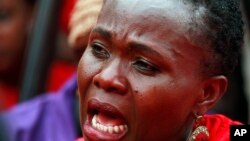The abduction of more than 200 young girls from a school in northern Nigeria by the militant group Boko Haram has been big news in recent months. But human rights advocates respond that this type of violence against women and young girls is nothing new.
In fact, kidnapping is one of the many forms of violence regularly practiced against women and young girls in developing countries. Other abuses include rape, sex trafficking, child marriages and child prostitution.
“The abduction of girls, use, misuse, abuse, selling of girls is a fairly wide practice,” said Michele Rickett, founder and chief executive officer of “She is Safe,” an organization that rescues and rehabilitates women and girls who are victims of abuse. “And, it’s only exacerbated under conflict, or - as in the case of the Boko Haram - they’re sort of combining purposes.”
Rickett is the author of “Forgotten Girls,” a newly released book that chronicles the lives of victims. The author has lived in and traveled to some of the most high-risk areas of the globe, and knows first-hand the plight of the abused women and girls.
“Often, when soldiers or terrorists of any kind go through a village, they will torch the village, take the boys and train them to kill, but take the girls and use them to do their cooking and cleaning, and for sex as well. So, that’s a pretty common practice wherever you see conflict in the world,” the author said.
Rickett said the often conflict-as-usual attitude of mistreating women was different with the April 2014 abduction of the Nigerian schoolgirls because of the advantage of the unexpected voices of the mothers of the girls. They were not going to remain silent.
“There was more than two weeks after the girls were abducted that the government really began to respond to the needs. And it was because the mothers were rallying and gathering others. So, I think that gives us a little clue how to keep the issues alive, even though it might be in a war or conflict as usual, in the abuse of girls,” remarked Rickett.
The mothers’ cries for the return of their daughters was heard around the world and many others joined in the call for their return. Other voices included human rights advocates, political figures, and celebrities.
Rickett says the public outcry was a sign that people do care about what is happening to women and girls in developing countries and conflict regions; That is the passion that will raise awareness to the urgency of breaking the cycle of violence.
The women’s rights advocate also pointed out the need for more programs to help women and girls cope with mental and emotional trauma that comes with being repeatedly abused.
“The post- traumatic stress on these girls really does call for a concerted effort for after-care -- to get them into a safe and predictable location where they can receive physical nourishment, emotional nourishment. And for their broken spirits to be healed as well,” Rickett said.











